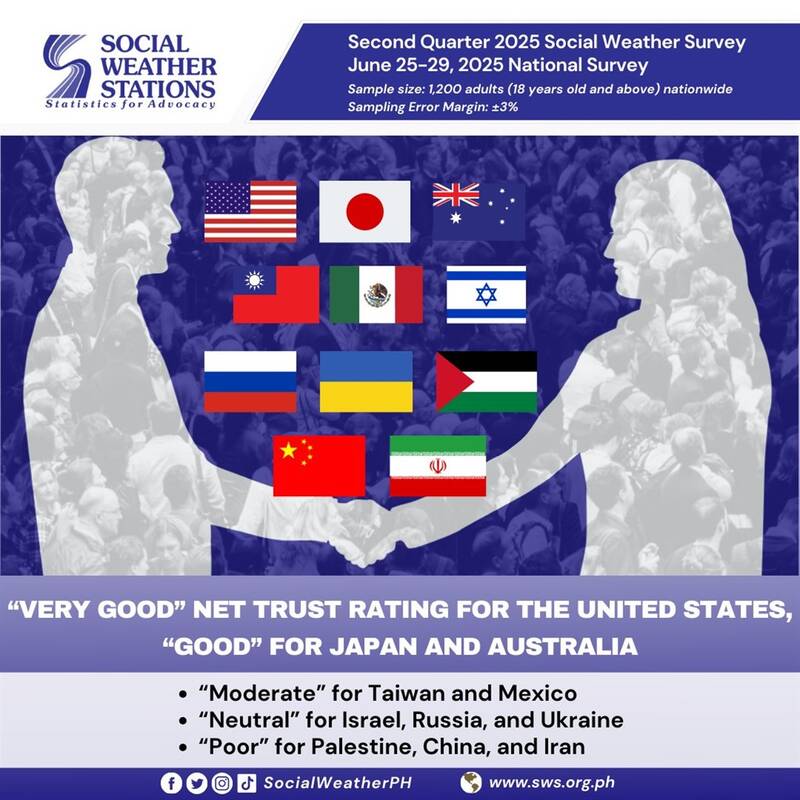Public trust in Taiwan among Filipinos has reached its highest level in more than a decade, according to the latest survey released Tuesday by Philippine pollster Social Weather Stations (SWS).
The June 25-29 survey gave Taiwan a net trust score of + 18, up from +13 in April, placing it behind only the United States (+63), Japan (+43), and Australia (+37). Under SWS standards, the score Taiwan received is classified as "moderate."
According to the poll, 42 percent of Filipinos have "much trust" in Taiwan, 24 percent have "little trust," and 31 percent are undecided. The survey was based on face-to- face interviews with 1,200 adults nationwide and has a margin of error of 3 percent.

Photo grab from www.sws.org.ph
In SWS’s first survey of Taiwan in September 2013, the net trust rating was -7. That came a few months after the "Kuang Ta Hsing No. 28" incident, in which a Taiwanese fisherman was killed by the Philippine Coast Guard.
Taiwan’s scores have remained positive since then, with this year’s +18 marking a record high.
Analysts have attributed the improved rating to closer ties between Taiwan and the Philippines in recent years, citing humanitarian aid from the Taiwanese government and business groups, as well as the experiences shared by some 200,000 Filipinos living in Taiwan, many of whom say they feel respected.
Increasing tourist arrivals from the Philippines -- now Taiwan’s largest source market in Southeast Asia -- have also contributed to favorable views, analysts said.
In contrast, China received a net trust score of -20, placing it second to last among countries surveyed. While that was an improvement from -30 in April, the score remains in the "poor" category. Iran ranked the lowest at -23.
Other countries in the survey included Mexico (+11), Israel (+7), Ukraine (-4), Russia (-2), and Palestine (-13).
Philippine Defense Department spokesperson Arsenio Andolong said the results show that Filipinos are aware of the sovereignty challenges Taiwan is facing and value the support of like-minded partners.

The manufacture of the remaining 28 M1A2T Abrams tanks Taiwan purchased from the US has recently been completed, and they are expected to be delivered within the next one to two months, a source said yesterday. The Ministry of National Defense is arranging cargo ships to transport the tanks to Taiwan as soon as possible, said the source, who is familiar with the matter. The estimated arrival time ranges from late this month to early next month, the source said. The 28 Abrams tanks make up the third and final batch of a total of 108 tanks, valued at about NT$40.5 billion

Two Taiwanese prosecutors were questioned by Chinese security personnel at their hotel during a trip to China’s Henan Province this month, the Mainland Affairs Council (MAC) said yesterday. The officers had personal information on the prosecutors, including “when they were assigned to their posts, their work locations and job titles,” MAC Deputy Minister and spokesman Liang Wen-chieh (梁文傑) said. On top of asking about their agencies and positions, the officers also questioned the prosecutors about the Cross-Strait Joint Crime-Fighting and Judicial Mutual Assistance Agreement, a pact that serves as the framework for Taiwan-China cooperation on combating crime and providing judicial assistance, Liang

A group from the Taiwanese Designers in Australia association yesterday represented Taiwan at the Midsumma Pride March in Melbourne. The march, held in the St. Kilda suburb, is the city’s largest LGBTQIA+ parade and the flagship event of the annual Midsumma Festival. It attracted more than 45,000 spectators who supported the 400 groups and 10,000 marchers that participated this year, the association said. Taiwanese Designers said they organized a team to march for Taiwan this year, joining politicians, government agencies, professionals and community organizations in showing support for LGBTQIA+ people and diverse communities. As the first country in Asia to legalize same-sex

MOTIVES QUESTIONED The PLA considers Xi’s policies toward Taiwan to be driven by personal considerations rather than military assessment, the Epoch Times reports Chinese President Xi Jinping’s (習近平) latest purge of the Chinese People’s Liberation Army (PLA) leadership might have been prompted by the military’s opposition to plans of invading Taiwan, the Epoch Times said. The Chinese military opposes waging war against Taiwan by a large consensus, putting it at odds with Xi’s vision, the Falun Gong-affiliated daily said in a report on Thursday, citing anonymous sources with insight into the PLA’s inner workings. The opposition is not the opinion of a few generals, but a widely shared view among the PLA cadre, the Epoch Times cited them as saying. “Chinese forces know full well that